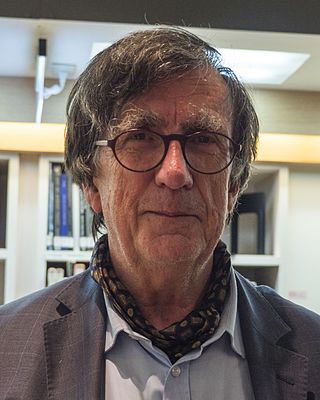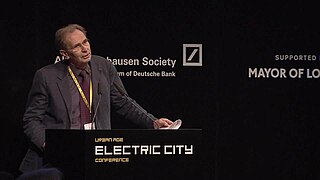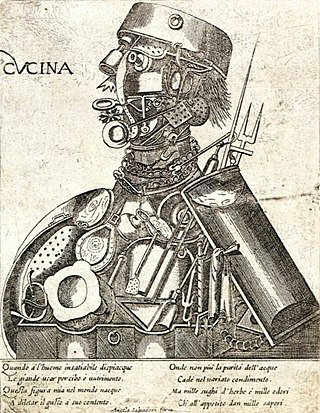Related Research Articles
An information society is a society or subculture where the usage, creation, distribution, manipulation and integration of information is a significant activity. Its main drivers are information and communication technologies, which have resulted in rapid growth of a variety of forms of information. Proponents of this theory posit that these technologies are impacting most important forms of social organization, including education, economy, health, government, warfare, and levels of democracy. The people who are able to partake in this form of society are sometimes called either computer users or even digital citizens, defined by K. Mossberger as “Those who use the Internet regularly and effectively”. This is one of many dozen internet terms that have been identified to suggest that humans are entering a new and different phase of society.

Bruno Latour was a French philosopher, anthropologist and sociologist. He was especially known for his work in the field of science and technology studies (STS). After teaching at the École des Mines de Paris from 1982 to 2006, he became professor at Sciences Po Paris (2006–2017), where he was the scientific director of the Sciences Po Medialab. He retired from several university activities in 2017. He was also a Centennial Professor at the London School of Economics.
Actor–network theory (ANT) is a theoretical and methodological approach to social theory where everything in the social and natural worlds exists in constantly shifting networks of relationships. It posits that nothing exists outside those relationships. All the factors involved in a social situation are on the same level, and thus there are no external social forces beyond what and how the network participants interact at present. Thus, objects, ideas, processes, and any other relevant factors are seen as just as important in creating social situations as humans.
Translation studies is an academic interdiscipline dealing with the systematic study of the theory, description and application of translation, interpreting, and localization. As an interdiscipline, translation studies borrows much from the various fields of study that support translation. These include comparative literature, computer science, history, linguistics, philology, philosophy, semiotics, and terminology.
Performativity is the concept that language can function as a form of social action and have the effect of change. The concept has multiple applications in diverse fields such as anthropology, social and cultural geography, economics, gender studies, law, linguistics, performance studies, history, management studies and philosophy.
Theories of technological change and innovation attempt to explain the factors that shape technological innovation as well as the impact of technology on society and culture. Some of the most contemporary theories of technological change reject two of the previous views: the linear model of technological innovation and other, the technological determinism. To challenge the linear model, some of today's theories of technological change and innovation point to the history of technology, where they find evidence that technological innovation often gives rise to new scientific fields, and emphasizes the important role that social networks and cultural values play in creating and shaping technological artifacts. To challenge the so-called "technological determinism", today's theories of technological change emphasize the scope of the need of technical choice, which they find to be greater than most laypeople can realize; as scientists in philosophy of science, and further science and technology often like to say about this "It could have been different." For this reason, theorists who take these positions often argue that a greater public involvement in technological decision-making is desired.
In computer science, the scientific community metaphor is a metaphor used to aid understanding scientific communities. The first publications on the scientific community metaphor in 1981 and 1982 involved the development of a programming language named Ether that invoked procedural plans to process goals and assertions concurrently by dynamically creating new rules during program execution. Ether also addressed issues of conflict and contradiction with multiple sources of knowledge and multiple viewpoints.
Michel Callon is a professor of sociology at the École des mines de Paris and member of the Centre de sociologie de l'innovation. He is an author in the field of Science and Technology Studies and one of the leading proponents of actor–network theory (ANT) with Bruno Latour.
The concept of an obligatory passage point (OPP) was developed by sociologist Michel Callon in a seminal contribution to actor–network theory: Callon, Michel (1986), "Elements of a sociology of translation: Domestication of the Scallops and the Fishermen of St Brieuc Bay". In John Law (Ed.), Power, Action and Belief: A New Sociology of Knowledge? London, Routledge: 196–233.
John Law, is a sociologist and science and technology studies scholar, currently on the Faculty of Social Sciences at the Open University. Law coined the term Actor-Network Theory (ANT) in 1992 when synthesising work done with colleagues at the Centre de Sociologie de l'Innovation.

According to Robin A. Williams and David Edge (1996), "Central to social shaping of technology (SST) is the concept that there are choices inherent in both the design of individual artifacts and systems, and in the direction or trajectory of innovation programs."

John Richard Urry was a British sociologist who served as a professor at Lancaster University. He is noted for work in the fields of the sociology of tourism and mobility.

Technology dynamics is broad and relatively new scientific field that has been developed in the framework of the postwar science and technology studies field. It studies the process of technological change. Under the field of Technology Dynamics the process of technological change is explained by taking into account influences from "internal factors" as well as from "external factors". Internal factors relate technological change to unsolved technical problems and the established modes of solving technological problems and external factors relate it to various (changing) characteristics of the social environment, in which a particular technology is embedded.

Sociology is the scientific study of human society that focuses on society, human social behavior, patterns of social relationships, social interaction, and aspects of culture associated with everyday life. Regarded as a part of both the social sciences and humanities, sociology uses various methods of empirical investigation and critical analysis to develop a body of knowledge about social order and social change. Sociological subject matter ranges from micro-level analyses of individual interaction and agency to macro-level analyses of social systems and social structure. Applied sociological research may be applied directly to social policy and welfare, whereas theoretical approaches may focus on the understanding of social processes and phenomenological method.
In science studies, the social process of blackboxing is based on the abstract notion of a black box. To cite Bruno Latour, blackboxing is "the way scientific and technical work is made invisible by its own success. When a machine runs efficiently, when a matter of fact is settled, one need focus only on its inputs and outputs and not on its internal complexity. Thus, paradoxically, the more science and technology succeed, the more opaque and obscure they become."
In actor-network theory (ANT), translation is the process that allows a network to be represented by a single entity, which can in itself be an individual or another network. It encompasses all negotiations, intrigues, calculations, and acts of persuasion, thanks to which an actor takes authority to speak or act on behalf of other actors. According to ANT, an actor is an actant, something made to act, therefore it includes both human and non-human entities. Non-humans can have interests, they can enroll others, in exactly the same way as humans do.
International political sociology (IPS) is an interdisciplinary field and set of approaches at the crossroads of international relations theory and other disciplines such as sociology, geography and anthropology. It is structured around initiatives such as the journal International Political Sociology and the network Doingips, as well as scholars such as Didier Bigo, Anastassia Tsoukala, Ayse Ceyhan or Elspeth Guild.

John Peter Scott is an English sociologist working on issues of economic and political sociology, social stratification, the history of sociology, and social network analysis. He is currently working independently, and has previously worked at the Universities of Strathclyde, Leicester, Essex, and Plymouth. He is a Fellow of the British Academy, a Fellow of the Royal Society of Arts, and a Fellow of the Academy of Social Sciences. He has been a member of the British Sociological Association since 1970. In 2015 he became Chair of Section S4 of the British Academy. In 2016 he was awarded an Honorary Doctorate of Essex University.

Cyborg anthropology is a discipline that studies the interaction between humanity and technology from an anthropological perspective. The discipline offers novel insights on new technological advances and their effect on culture and society.
Madeleine Akrich is a French sociologist of technology. She served as the director of the Center for the Sociology of Innovation at Mines ParisTech from 2003 to 2013. She is known for developing actor–network theory (ANT) with Bruno Latour, Michel Callon, John Law and others.
References
- ↑ Callon, M., 1986. Some elements of a sociology of translation: domestication of the scallops and the fisherman in St Brieuc Bay Archived 2018-11-23 at the Wayback Machine . In K. Knorr-Cetina & A. V. Cicourel, eds. Advances in Social Theory and Methodology: Toward an Integration of Micro and Macro-Sociologies. Boston: Routledge & Kegan Paul, pp. 196-223.
- ↑ Latour, B., 1992. Technology is society made durable. In Sociology of Monsters: Essays on Power, Technology and Domination. London: Routledge, pp. 103-130.